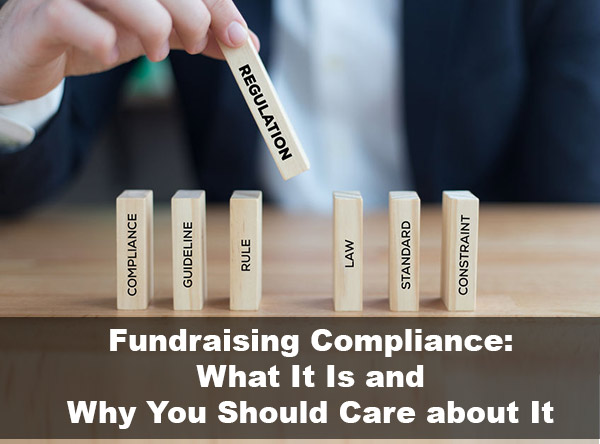Nonprofits fundraise. It’s a fact of life and a necessity of existence. Successful fundraising efforts mean a robust community, filled with engaged donors and healthy programs. A lesser known component of fundraising, and therefore a nonprofit’s success, is compliance with state fundraising and charitable solicitation laws.
The topic of fundraising compliance is foreign to many founders, boards, and leadership of organizations of all types and sizes. But it underpins a nonprofit’s ability to raise funds legally, provide transparency to donors and the community, and to grow development efforts.
In this post, we’ll cover the 5 Ws of fundraising compliance: Who, What, When, Where, and Why. If this subject is new to you, consider this an introduction and a conversation starter.
Let’s dive in!
What is Fundraising Compliance?
Fundraising compliance is your nonprofit’s adherence to the charitable solicitation laws that exist in about 45 states (states add, change, and remove laws/requirements frequently). In most of those states, nonprofits are generally required to register with the charity office of each state in which they solicit.
The process of registration consists of submitting a paper or an online application, information about the organization’s board and fundraising activity, copies of organizational records, your 990 tax return, and a filing fee. In each state, nonprofits are then expected to renew their registration annually by submitting a new application, updated program and financial information, and you guessed it, another filing fee. Finally, in many states, nonprofits are required to make certain disclosures on their solicitation materials, which inform prospective donors where to find more information about who is asking them to give.
Who Does Fundraising Compliance Apply To?
With only a few exceptions, state requirements apply to any organization soliciting charitable contributions from the public. While these requirements vary, the operative term is “soliciting,” which importantly refers to the act of asking for, and not necessarily the receipt of, funds.
Solicitation is broadly defined, too, and can include sending email and letters, making phone calls, applying for grants, and having a “Donate Now” button on your website. Nonprofits soliciting by any number of these methods should be aware of the potential for registration and other requirements in one or more states.
Where Does Our Organization Need to Register?
Nonprofits should review the requirements of any states in which they have an existing donor base, conduct program activities, or otherwise raise funds. Organizations that solicit without having complied with a particular state’s requirements should take action to remedy the situation as soon as possible.
Organizations should also take care to review requirements in states where they are looking to start fundraising, and pay particular attention to campaigns that will take place online, which may trigger registration requirements in additional places. Organizations that have a large “fundraising footprint” may find that they have to register in several states, if not nationwide.
When Should Registration Take Place?
Almost every state requires that organizations register prior to beginning solicitation activities. Nonprofits that are newly formed or are ramping up their fundraising efforts should proactively submit the requisite materials to comply. For established organizations and those that may have been soliciting without have registered, there is some good news. Registration can take place any time, and most states do not penalize organizations that register in good faith. If your organization knows it needs to register, prompt action is the best way to remedy the situation.
It’s also important to mention that the actual process of registration can take weeks or months, depending on the state and its processing times. Nonprofits should ensure that registration applications are filed well in advance of any events, fundraising campaigns, or other critical internal deadlines. If your organization plans to manage its own registration applications, don’t forget to consider the time and resources involved in preparing, filing, tracking, and possibly resubmitting rejected applications.
Also read: 8 Ways a Nonprofit Can Deal with Negative Online Reviews
Why Should You Care about Compliance?
One of the most frequent questions we get from nonprofit leadership is, “Why do we need to register? We’ve never done this before or got caught.” That very well may be the case for your organization, but the reality is that state registration, reporting, and other requirements are the law. If that’s still not enough to persuade you, consider the following:
Donors and grantmakers can and do research registered charitable organizations when they are making a decision to give. Maintaining registration ensures that donors can learn more about your organization and feel good about their gift, and contributes to the overall transparency in the sector.
As an officer, director, or employee of a nonprofit, you share the responsibility of running an ethical, public-serving organization. No doubt, you’ve designed program activities to serve your community to the best of your ability. Proper registration and compliance with state laws help ensure that your fundraising and solicitation activities are also done fully within the public’s eye.
Finally, I mentioned growth. While the subject of compliance (and actually registering your organization) can be complex, opportunity lies within. Organizations that commit to a culture of compliance can leverage their proper registration status to fundraise anywhere, by any lawful means. Development staff can use compliance to demonstrate transparency to donors and seek new sources of funding support, ranging from grant funding, individual contributions, and even widespread cause marketing campaigns.
Ultimately, the first step to take on the path to compliance is a conversation with your board. If this was your first foray into fundraising compliance, chances are good that this is unfamiliar to them, as well. In that conversation, discuss where your organization has registered, and where it should, as well as any risks and opportunities that you face.
On an annual basis, discuss making compliance a line item in your organization’s budget, and set a reminder to review compliance-related issues as your fundraising and development efforts change. By doing so, your organization can not only feel good by doing the right thing, but it can leverage compliance like never before.
Harbor Compliance is not an accounting or law firm and does not provide tax, financial, or legal advice.
About the Author:
James Gilmer, Compliance Specialist at Harbor Compliance
Founded by a team of government licensing specialists and technology trailblazers, Harbor Compliance is a leading provider of compliance solutions for companies of all types and sizes. Since 2012, we have helped more than 15,000 organizations apply for, secure, and maintain licensing across all industries.


